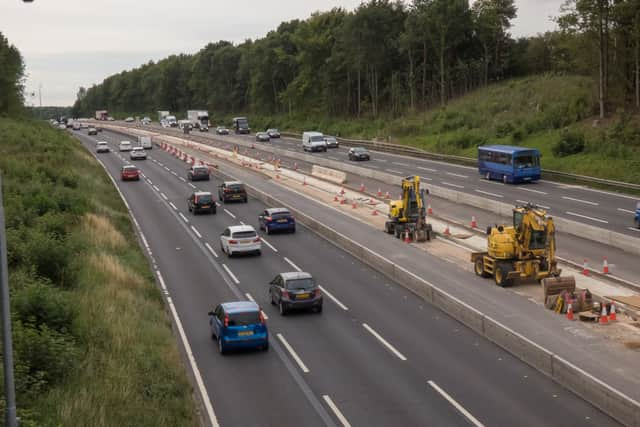Smart motorway safety: Why MPs have called for a delay to roll-out
and live on Freeview channel 276
The roll-out of smart motorways should be halted until there is more evidence on their safety, according to MPs.
Members of the House of Commons’ Transport Select Committee (TSC) have called on the Government to pause any further roll-outs until an independent review of at least five years’ data has been conducted.
Advertisement
Hide AdAdvertisement
Hide AdIn a new report, the TSC said there was not enough safety or economic data to support the continuation of the project and said the Government’s decision in March 2020 to make all new smart motorways all-lane-running (ALR) was “premature”.
The report said: “The Government and National Highways should pause the rollout of new all-lane running schemes until five years of safety and economic data is available for every all-lane running scheme introduced before 2020 and the implementation of the safety improvements in the Government’s action plan has been independently evaluated.”
It also encouraged the Government to consider “alternative options” to increase motorway capacity.
The Department for Transport welcomed the commitee’s report and said it would “engage closely” with it in coming months.
Advertisement
Hide AdAdvertisement
Hide AdSmart motorways, where hard shoulders are replaced with live lanes, are seen as a relatively quick and cheap way to increase road capacity but concerns have been raised over the number of fatal collisions involving broken-down vehicles stranded in live lanes.
National Highways (formerly Highways England) and the UK Government have repeatedly insisted that, mile-for-mile, smart motorways are safer than conventional motorways but figures released by Highways England show that in 2018 and 2019 ALR roads had more deaths per hundred million miles than regular motorways with a hard shoulder.
The committee’s chairman, Huw Merriman said more evidence was needed.


He commented: “Looking at the available evidence, smart motorways do appear to be safer than conventional motorways even once the hard shoulder is removed.
Advertisement
Hide AdAdvertisement
Hide Ad“However, this evidence is also open to question. Only 29 miles of these all-lane running smart motorways have operated for over five years.
“It therefore feels too soon, and uncertain, to use this as an evidence base to remove the hard shoulder from swathes of our motorway network.”
In 2020 the Department for Transport stopped the introduction of new “dynamic hard shoulder” motorways where the hard shoulder is converted to a live lane only during busy periods. The TSC said it should revisit this policy as such controlled smart motorways had the “lowest casualty rates” of any motorway or A road.
The committee also said that an 18-point plan to improve smart motorway safety, announced in March 2020, failed to “fully address the risks associated with the removal of the hard shoulder”.
Advertisement
Hide AdAdvertisement
Hide AdEarlier this year, Transport Secretary Grant Shapps said no new stretches of ALR road would open without new stopped vehicle detection technology and pledged to install the system on all existing stretches by September 2022.
Some campaigners want to see all smart motorway projects scrapped and the hard shoulder reinstated across the motorway network. Protesters marched on Parliament on Monday carrying coffins representing those killed in incidents on smart motorways.
Claire Mercer, whose husband Jason, was killed in a collision on a smart stretch of the M1, said: “They keep doing review after review after review. In the meantime, people are still dying.”
The TSC report, however, rejected the idea of reintroducing the hard shoulder everywhere, saying the evidence suggested such a move could put more people at risk of death or serious injury. It concluded: “The Government is right to focus on upgrading the safety of all-lane running motorways.”
Advertisement
Hide AdAdvertisement
Hide AdA DfT spokesperson said: “We’re pleased that the TSC recognises that reinstating the hard shoulder on all all-lane running motorways could put more drivers and passengers at risk of death and serious injury and that we’re right to focus on upgrading their safety..
“We recognise that improvements have not always been made as quickly as they could have been in the past, but as the committee has set out, the Transport Secretary is absolutely committed to making smart motorways as safe as possible, including committing £500 million on upgrades and the faster rollout of stopped vehicle detection.”
Comment Guidelines
National World encourages reader discussion on our stories. User feedback, insights and back-and-forth exchanges add a rich layer of context to reporting. Please review our Community Guidelines before commenting.
